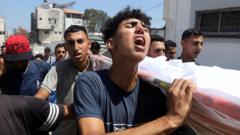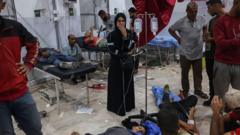The recent bombardment of al-Ahli hospital in Gaza City has severely hindered medical services, raising alarms as the region grapples with critical shortages of supplies amid ongoing conflict.
Gaza Hospitals in Crisis: WHO Warns of Catastrophic Conditions

Gaza Hospitals in Crisis: WHO Warns of Catastrophic Conditions
The World Health Organization has issued a dire warning about the situation in Gaza hospitals, declaring conditions as "beyond description" following Israeli air strikes.
The World Health Organization (WHO) has described the situation in Gaza's hospitals as "beyond description," particularly after an Israeli air strike on the al-Ahli hospital knocked out critical medical services. Dr. Margaret Harris, a WHO spokesperson, emphasized the continuous and dangerous attacks on healthcare facilities and stated that medical supplies are critically low due to the ongoing Israeli blockade.
On Sunday, al-Ahli hospital staff reported that an Israeli strike not only destroyed its laboratory but also caused significant damage to the emergency room. While no direct casualties were reported from the strike, tragic consequences ensued as a child died during the chaotic evacuation process, attributed to the disruption of care. The Israeli military defended the attack, claiming it targeted a Hamas “command-and-control center.”
This was the fifth time al-Ahli hospital has been hit since the conflict escalated. The Anglican Diocese of Jerusalem, which manages the hospital, criticized the attack and called for evidence supporting the Israeli military’s claims. The bishops expressed their shock that medical institutions have been turned into battlegrounds and called for an independent investigation into the air strike.
As a result of the latest attack, WHO Director-General Dr. Tedros Adhanom Ghebreyesus revealed that the hospital's emergency room and pharmacy suffered devastating losses, forcing the relocation of many patients. However, Dr. Rik Peeperkorn of the WHO indicated that the hospital could not accept new patients pending repairs, posing a significant risk to those needing urgent trauma care.
The Church of England’s bishops echoed concerns over the emergency evacuation, arguing that the limited warning issued to staff and patients violated basic human rights. Moreover, the deterioration of medical services was compounded by a desperate shortage of medical supplies, which WHO representatives warned could jeopardize the health and wellbeing of the population.
Dr. Peeperkorn also noted that the ongoing blockade has prevented the delivery of essential medical supplies for over six weeks. Medical professionals at al-Ahli have resorted to reusing surgical gowns and gloves, a situation he described as untenable.
As the conflict continues, Israel claims it initiated military actions in response to a surprise attack from Hamas on October 7, 2023, which left approximately 1,200 people dead. Since then, many lives have been lost, with reported numbers exceeding 50,980 casualties as the stalemate persists.
Situation discussions regarding a potential renewed ceasefire revealed that despite the flexibility of Hamas concerning hostage negotiations, progress remains stalled due to Israel’s refusal to end military operations. While Prime Minister Benjamin Netanyahu maintains dialogue about reducing hostages to be exchanged, parents of hostages expressed frustration at the government's ongoing betrayals.
The deteriorating situation in Gaza's hospitals highlights the urgent need for humanitarian aid and a ceasefire, as health services struggle to meet escalating demands amid relentless violence.






















